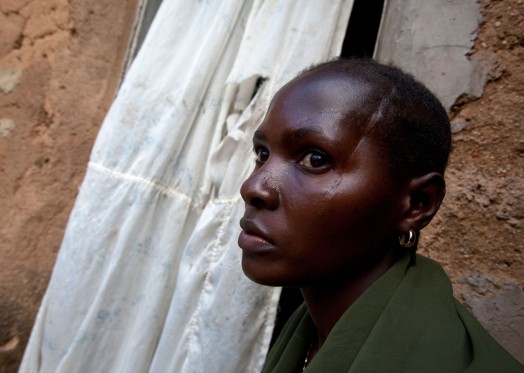Boko Haram revisited

The rain is a blessing. It pours lavishly from the thundering clouds filling the ponds and the scorched fields. Now the Beroms in Dogo Nahawa can plant the corn and water their gardens outside the village: they’ll soon harvest new food for their children.
I walk a short distance towards the rocky hills to the burial ground: a large stone platform and an iron cross mark the mass grave where 500 mutilated bodies were put to rest after the 2010 massacre. “At 1.30 a.m. on March 7th we were all sleeping” says Daniel Jik, the 60 years old local chief. “The attackers stormed the village from those hills, without warning. They came down in hundreds, armed with machetes, Ak-47 and heavy machine guns. I escaped with my wife through the back door but all our ten children were shot or cut into pieces”. Huts were burned and crushed to rubble.
In a half-built house two Irish nuns teach English classes to the surviving kids and strive to heal their inner wounds. Eleven years old Abigael lost two brothers. Elizabeth, 12, still remembers the gun shots, the screams and the fire: she saw two of her sisters stabbed to their death.
Then I meet stone-faced Lydia in the porch of her mud-brick hut. She is a beautiful young woman in her mid twenties but there’s no more light in her eyes: it waned on that dreadful night, with her dreams and her smile. A scar cuts through her head and cheek, the hands reduced to useless stumps. “It was dark, I was running, they grabbed me and hit me with blades. I fell. They left. I’m still alive because they thought I was dead”.
“Boko Haram?” I hint. “Fulani herders” she says.
It takes some time and a lot of talking to start grasping the complexity of the conflict which is ravaging Nigeria’s north-east: a conflict which is commonly portraited as a muslims vs. christians religion war.
In the past three years violence has escalated in several northern states, with a death toll roughly put at 3,000 mostly civilian victims. And just a few hours drive from here (I am in Jos, Plateau state: journalists are restricted in traveling further north) president Goodluck Jonathan has launched a fresh military offensive against the al-Qaida linked Boko Haram terrorist group, whose strongholds and training camps have reportedly expanded in the vast runaway regions bordering Niger, Chad and Cameroon.
Religion is certainly a factor. Indeed, several northern states have already imposed the sharia law. In Jos churches have been suicide-bombed, mosques have been burned, thousands of houses have been razed in revenge attacks: muslims and christians now live in segregated areas of the city with military road blocks in the streets. But none of the prominent community leaders I meet refers to the conflict as a religion war. Both Archibishop Ignatious Kaigama and his islamic counterpart, Sheikh Balarabi Daud, the imam of the Central Mosque, point to other more relevant factors, deeply rooted in the history of the country, in its corrupted political institutions and its hugely unequal economic system. And both believe the ongoing military crackdown will get nowhere close to solve the problem, since the disbanded militamen are likely to hide undercover for some time only to regroup and strike back as the pressure on them will ease.
The bloody warfare has been in fact in place for decades, long before Boko Haram surfaced. It dates back to the colonial time, when Hausa muslims were lured to work in the British owned tin mines in the central belt; and intensified after independence, with a federal Constitution that doesn’t grant equal political and social rights to natives and migrants from other states. Muslim minorities are discriminated in mainly christian provinces, and vice versa: an ominous outcome stemmed from the artificial birth of a deeply divided nation. The african-christian-animistic south has nothing in common with the islamic north: they speak different languages, worship different gods, live in a different natural and economic environment, eat different food, follow different traditional customs.
The collision was unavoidable. In borderline states like Plateau the nomadic Fulani herders regularly pushed their cattle to graze on cultivated land, thus provoking the violent reaction of the farmers in an ever ending and increasingly bloody vicious cycle. Spears and machetes were soon replaced by Rpgs and machine guns. Then came Boko Haram with the car bombs, the suicide attacks and the jihadist propaganda: its young foot soldiers easely recruited among the growing jobless legions of the poors and the illiterates.
In the first oil producing country of the continent gasoline has to be imported and even the capital Abuja suffers constant blackouts. Half of the 150 millions nigerians survive with less than a dollar a day while billions of oil royalties are squandered or merely stealed by some of the planet’s most corrupt and rapacious politicians. Eagerly plunged into the oil’s bonanza they are neglecting the vital agricultural and industrial sectors. Most public funds are spent in megalomaniac projects while schools, hospitals and roads are left in pitiful conditions.
On my last day in Jos I drive to a nearby abandoned tin mine. Illegal diggers risk their lives down the pits and the shafts to fill bags of a the new found wealth: high valued coltan (columbite-tantalite) sought after by the electronic giants. Priscilla works hard with the team – her husband and three helpers – from dawn to dusk, washing and cleansing tons of brown-reddish heaps of sand. She is widely respected among the japanese and chinese buyers and down in the mine, where she grew up learning dad’s job: she can tell the grade and quality of the minerals at first sight. She is in the pit 7 days a week, her legs sunk deep into the water. “At forthy I’ll be worn out” she says. “But I can send all my four children to a private school. I swear God they’ll never set foot in the pits!”





